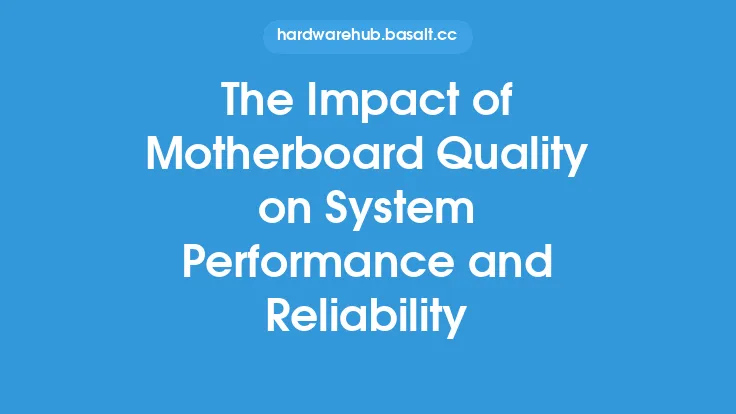The security and integrity of a system's data are of paramount importance in today's digital age. As technology continues to advance and evolve, the potential risks and threats to system security and data protection also increase. One crucial aspect that plays a significant role in maintaining the security and integrity of a system is hardware upkeep. Regular maintenance and upkeep of hardware components can help prevent security breaches, protect sensitive data, and ensure the overall reliability and performance of the system.
Introduction to Hardware Upkeep and Security
Hardware upkeep refers to the regular maintenance and care of hardware components to ensure they function optimally and efficiently. This includes tasks such as cleaning, updating firmware, and replacing worn-out or faulty components. When it comes to system security and data protection, hardware upkeep is essential in preventing potential vulnerabilities and threats. For instance, a faulty or outdated hardware component can create a backdoor for hackers to gain unauthorized access to the system, compromising sensitive data and putting the entire network at risk.
The Impact of Hardware Upkeep on System Security
Regular hardware upkeep can significantly impact system security in several ways. Firstly, it helps prevent hardware failures, which can lead to data loss and corruption. When a hardware component fails, it can cause the system to crash or become unresponsive, resulting in lost or corrupted data. By maintaining hardware components, the risk of hardware failures is minimized, ensuring that the system remains stable and secure. Secondly, hardware upkeep helps prevent unauthorized access to the system. Outdated or faulty hardware components can create vulnerabilities that hackers can exploit to gain access to the system. By keeping hardware components up-to-date and well-maintained, these vulnerabilities are eliminated, reducing the risk of security breaches.
The Role of Firmware Updates in Hardware Upkeep
Firmware updates play a critical role in hardware upkeep and system security. Firmware is the software that controls the hardware components, and updating it regularly ensures that any security vulnerabilities or bugs are patched. Outdated firmware can create vulnerabilities that hackers can exploit to gain access to the system. Regular firmware updates help prevent these vulnerabilities, ensuring that the system remains secure and protected. Additionally, firmware updates can also improve the performance and efficiency of hardware components, ensuring that they function optimally and efficiently.
The Importance of Physical Security in Hardware Upkeep
Physical security is another critical aspect of hardware upkeep that plays a significant role in system security and data protection. Physical security refers to the measures taken to prevent unauthorized physical access to hardware components. This includes measures such as locking servers and data centers, using secure cables and connections, and implementing access controls. Physical security is essential in preventing unauthorized access to hardware components, which can compromise system security and data integrity. For instance, if an unauthorized individual gains physical access to a server, they can potentially steal or tamper with sensitive data, compromising the entire system.
The Impact of Hardware Upkeep on Data Protection
Regular hardware upkeep is also essential in protecting sensitive data. Hardware components such as hard drives and solid-state drives (SSDs) store sensitive data, and if they fail or are compromised, the data can be lost or corrupted. By maintaining these hardware components, the risk of data loss or corruption is minimized, ensuring that sensitive data remains protected. Additionally, hardware upkeep can also help prevent data breaches by eliminating vulnerabilities that hackers can exploit to gain access to sensitive data. For instance, a faulty or outdated hardware component can create a vulnerability that hackers can exploit to gain access to sensitive data, compromising the entire system.
Best Practices for Hardware Upkeep and Security
To ensure the security and integrity of a system, it is essential to follow best practices for hardware upkeep and security. This includes regular maintenance and upkeep of hardware components, such as cleaning, updating firmware, and replacing worn-out or faulty components. Additionally, it is essential to implement physical security measures, such as locking servers and data centers, using secure cables and connections, and implementing access controls. It is also crucial to use secure protocols and encryption methods to protect sensitive data, both in transit and at rest. By following these best practices, the risk of security breaches and data loss is minimized, ensuring that the system remains secure and protected.
The Future of Hardware Upkeep and Security
As technology continues to evolve and advance, the importance of hardware upkeep and security will only continue to grow. With the increasing use of cloud computing, artificial intelligence, and the Internet of Things (IoT), the potential risks and threats to system security and data protection will also increase. Therefore, it is essential to stay ahead of these threats by implementing robust hardware upkeep and security measures. This includes investing in advanced security technologies, such as intrusion detection and prevention systems, and implementing secure protocols and encryption methods to protect sensitive data. By prioritizing hardware upkeep and security, individuals and organizations can ensure the integrity and security of their systems, protecting sensitive data and preventing potential security breaches.
Conclusion
In conclusion, hardware upkeep plays a critical role in maintaining the security and integrity of a system. Regular maintenance and upkeep of hardware components can help prevent security breaches, protect sensitive data, and ensure the overall reliability and performance of the system. By following best practices for hardware upkeep and security, individuals and organizations can minimize the risk of security breaches and data loss, ensuring that their systems remain secure and protected. As technology continues to evolve and advance, the importance of hardware upkeep and security will only continue to grow, making it essential to prioritize these measures to stay ahead of potential threats and risks.





